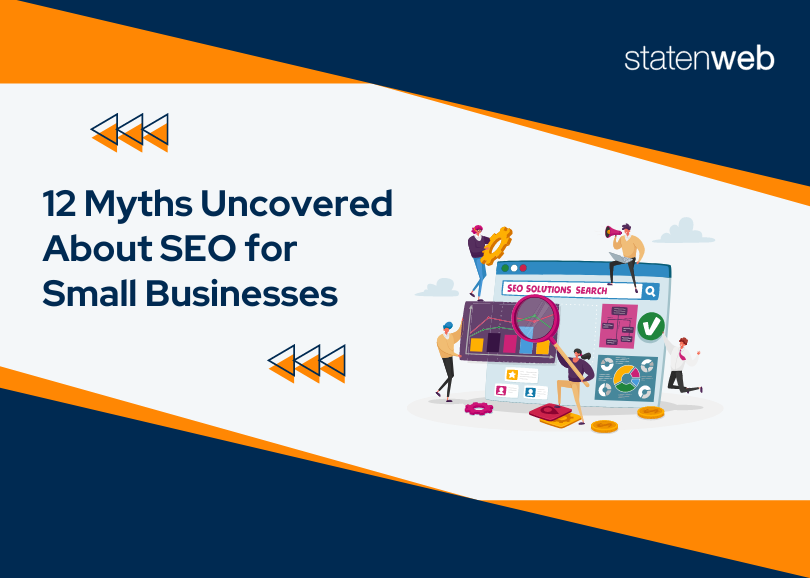
As a small business owner, learning the most efficient ways to grow your business is important.
There are many misconceptions out there about search engine optimization (SEO). Not all strategies are effective for every business; some are outdated or not tested, and others misinterpret how Google works and ranks content.
Here are 12 common SEO myths we’ve uncovered to guide your small business.
1. There’s a specific publishing frequency that works best for all.
When you post content regularly, your audience will appreciate the consistency. However, no set frequency would give you an edge over competitors.
In a survey by Search Engine Journal, 70 percent responded that the most effective publishing frequency is publishing high-quality and quantity content.
Experiment with different publishing frequencies to find which will lead to your business’s most significant growth.
2. Keyword research is not worth your time.
Your audience has specific needs and wants. You must do keyword research to serve them best and discover the words and phrases they seek. These keywords will ensure the right audience with the right search intent sees your carefully executed content.
3. The more keywords you use, the better.
Just using a lot of keywords is not enough. Regarding keyword density, it’s better to naturally and strategically place the keywords than to overstuff your content randomly.
4. You will be penalized for duplicate content.
Experts believe that 30% of the content on the Internet is duplicated. It’s a common misconception that you will be penalized for having this duplicate content on your site.
While there is no direct content penalty, your content could get buried by the search engine while the original copy ranks higher. To avoid this confusion, you can use tools, including Copyscape, to check for duplicate content.
5. You don’t need to perform a competitor analysis.
If you don’t know what’s working for your competitors, how will you know where to start with SEO? Practical competitor analysis includes technical SEO, content, and links. Once you see what leads to success in your industry, you can develop a better SEO strategy.
6. A website audit is not related to SEO optimization.
A website audit can be used to find errors in HTML, broken links, and more. It will also give you insight into your site’s speed and security issues.
The audit is essential in providing feedback on factors such as site architecture, on-page optimization and indexing, which are crucial for search engine optimization.
7. After some changes, you should expect a difference in your page rank overnight.
After implementing SEO tactics, some people expect to rank first on the Google search immediately. There is no set timeline for when you will see an improvement. Still, the best practice is to continuously improve your site based on the user experience and eventually, your efforts will be reflected in search results.
8. SEO shortcuts will save you time and yield the best results.
Time-saving is essential in business, but not at the expense of quality results. For SEO, solely using shortcuts will not help you in the long run, and these shortcuts will lead you to results without a specific digital marketing strategy.
SEO tools, and a detailed SEO strategy, are the preferred choice as they will help you thoroughly analyze your website regarding technical expertise, marketing strategies, and more.
9. You need to have a lot of backlinks.
For backlinks, it is quality over quantity that matters. As Semrush points out, one of the best ways to earn backlinks is to create content people naturally want to link to.
Google values sites with authority, so your web page should have a few different meaningful backlinks than to have many random ones.
10. You must rank first.
Your ultimate goal is to drive more customers to your site to increase potential leads and revenue. Investing in ranking first for keywords may not be necessary, and achieving a higher ranking, such as 2nd, 3rd, or even 4th, can still bring decent organic traffic and similar benefits to your business.
11. An optimized website is enough.
It would be best to consider several ranking factors when thinking about SEO. Is your site mobile-friendly? Do you have high-quality blogs and social media posts? Are you using a Google Business Profile to prove your site is trustworthy?
Think of the whole picture when it comes to SEO.
12. You only have to work on an SEO plan once.
You must keep up with the best SEO practices to continuously improve and grow your business. Always remember that SEO is an ongoing activity. Your plan will evolve with your business over time, depending on changing needs.
Be in the Know about SEO with StatenWeb
You may hear a lot of “dos” and “don’ts” for SEO small business strategies. The biggest takeaway is that the only plan that works for everyone is gearing your decisions around your existing and potential customers’ needs.
Contact StatenWeb today, and we can further debunk common SEO myths as we help you build your business with exceptional design services. We will ensure that you stand out from your competitors with a cutting-edge website built and maintained following the latest SEO trends.